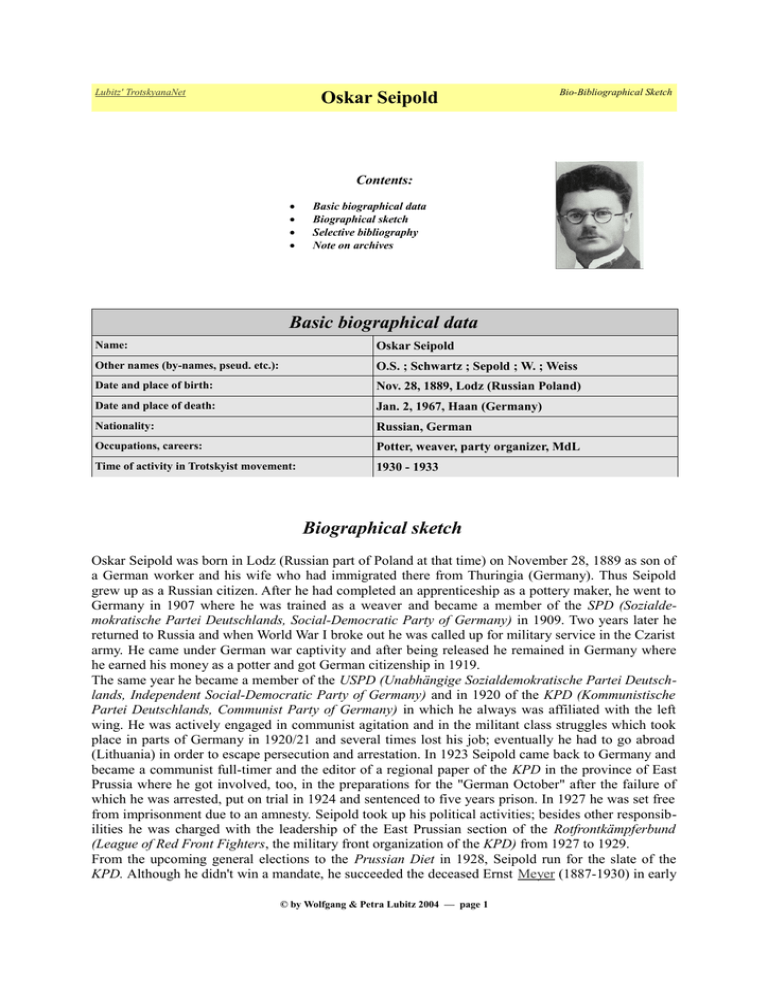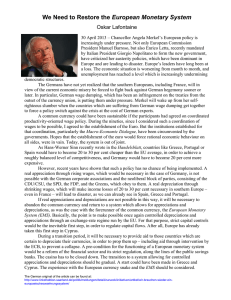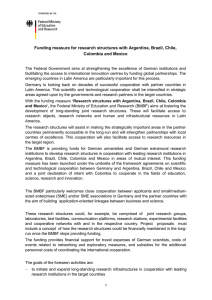Bio-bibliographical sketch of Oskar Seipold
Anuncio

Lubitz' TrotskyanaNet Oskar Seipold Bio-Bibliographical Sketch Contents: Basic biographical data Biographical sketch Selective bibliography Note on archives Basic biographical data Name: Oskar Seipold Other names (by-names, pseud. etc.): O.S. ; Schwartz ; Sepold ; W. ; Weiss Date and place of birth: Nov. 28, 1889, Lodz (Russian Poland) Date and place of death: Jan. 2, 1967, Haan (Germany) Nationality: Russian, German Occupations, careers: Potter, weaver, party organizer, MdL Time of activity in Trotskyist movement: 1930 - 1933 Biographical sketch Oskar Seipold was born in Lodz (Russian part of Poland at that time) on November 28, 1889 as son of a German worker and his wife who had immigrated there from Thuringia (Germany). Thus Seipold grew up as a Russian citizen. After he had completed an apprenticeship as a pottery maker, he went to Germany in 1907 where he was trained as a weaver and became a member of the SPD (Sozialdemokratische Partei Deutschlands, Social-Democratic Party of Germany) in 1909. Two years later he returned to Russia and when World War I broke out he was called up for military service in the Czarist army. He came under German war captivity and after being released he remained in Germany where he earned his money as a potter and got German citizenship in 1919. The same year he became a member of the USPD (Unabhängige Sozialdemokratische Partei Deutschlands, Independent Social-Democratic Party of Germany) and in 1920 of the KPD (Kommunistische Partei Deutschlands, Communist Party of Germany) in which he always was affiliated with the left wing. He was actively engaged in communist agitation and in the militant class struggles which took place in parts of Germany in 1920/21 and several times lost his job; eventually he had to go abroad (Lithuania) in order to escape persecution and arrestation. In 1923 Seipold came back to Germany and became a communist full-timer and the editor of a regional paper of the KPD in the province of East Prussia where he got involved, too, in the preparations for the "German October" after the failure of which he was arrested, put on trial in 1924 and sentenced to five years prison. In 1927 he was set free from imprisonment due to an amnesty. Seipold took up his political activities; besides other responsibilities he was charged with the leadership of the East Prussian section of the Rotfrontkämpferbund (League of Red Front Fighters, the military front organization of the KPD) from 1927 to 1929. From the upcoming general elections to the Prussian Diet in 1928, Seipold run for the slate of the KPD. Although he didn't win a mandate, he succeeded the deceased Ernst Meyer (1887-1930) in early © by Wolfgang & Petra Lubitz 2004 — page 1 Lubitz' TrotskyanaNet Bio-Bibliographical Sketch Oskar Seipold 1930. As an uncompromising adherent of the party's left wing, Seipold in 1929 had got in conflict with the KPD leadership and in 1930 became a member of the Trotskyist Vereinigte Linke Opposition (United Left Opposition) which later was renamed Linke Opposition der KPD (Bolschewiki-Leninisten) (Left Opposition of the KPD - Bolsheviks-Leninists). When the KPD leadership called upon Seipold to abandon his brief immediately – in order to replace him by a party liner – he refused and was consequently expelled from the ranks of the party on February 22, 1930. Thus for the remaining time of the legislature which ended only in April 1932, Seipold functioned as a representative of the German Trotskyists in the Prussian Diet where he rose to speak as often as possible and sometimes quoted longer passages from Trotsky's topical writings on subjects like for example the dangers of the ultra-sectarian KPD policy and the deadly danger for the entire German workers' movement emanating from the rise of Hitler's NSDAP. The lively correspondence with Trotsky bears witness to his intensive participation in elaborating Seipold's speeches. Thus Seipold could be called Trotsky's mouthpiece in a German parliament, too. Some of his speeches before the Prussian Diet were reprinted in Permanente Revolution, the organ of the Linke Opposition der KPD. At that time Seipold was a member of the Reichsleitung (central leadership) of the German Left Opposition and one of its most active speakers and organizers who travelled almost all parts of Germany where the Trotskyists had strongholds or local groups; due to fortunate circumstances, Seipold travelled for free as all members of the German parliaments were granted complementary tickets by the Reichsbahn (German National Railways). It goes without saying that Seipold was also involved in the sharp factional controversies and personal rivalries which at that time characterized the interior life of the German section of the ILO (International Left Opposition), e.g. when he participated as German delegate in the first (constituent) international conference of the ILO which was held in Paris in April 1930. After the Nazi seizure of power in early 1933 Seipold was arrested in Insterburg (East Prussia) without indictment on March 2, 1933 and had to spent more than one year in several prisons. After his release in 1934 he settled in Königsberg (East Prussia) from where he had to flee to Prague where he lived under his pseudonym Weiss; there he became target of a denunciation by a Stalinist KPD member. The Stalinized KPD seemed never to forgive Seipold's 1930 acting and continued to slanderously call him a 'Trotsky fascist'. To escape further denunciations and perhaps persecution he fled to Lodz in 1935, the city where he was born and where he could survive the War under the false identity of 'Sepold'. Withdrawn from politics he nevertheless preferred to leave Poland in October 1945 and to settle in Germany again, where he settled in Saxony before he went to Northrhine-Westphalia in 1949 1. He died at the age of 77 in Haan on January 2, 19672. Selective bibliography 3 Selective bibliography: Journals (co-)edited by Seipold Der Kommunist : Zeitschrift der Vereinigten Linken Opposition der K.P.D. (Berlin) <TSB 0846> Selective bibliography: Journals to which Seipold contributed Der Kommunist : Zeitschrift der Vereinigten Linken Opposition der K.P.D. (Berlin) <TSB 0846> Permanente Revolution : Zeitschrift der Linken Opposition der KPD (Bolschewiki-Leninisten) (Berlin) <TSB 1192> 1) No further biographical details known. 2) According to another source he died on December 29, 1966. 3) TSB item numbers (e.g. <TSB 0716>) refer to Lubitz’ Trotskyist Serials Bibliography, München [etc.] : Saur, 1993, which is out of print but available as PDF file within the framework of the Lubitz' TrotskyanaNet website. In TSB you can find detailed descriptions of the respective Trotskyist journals, newsletters, bulletins and the like. © by Wolfgang & Petra Lubitz 2004 — page 2 Lubitz' TrotskyanaNet Oskar Seipold Bio-Bibliographical Sketch Selective bibliography: Books and articles about Seipold [Anon.]: Oskar Seipold. [Biographical sketch, Wikipedia article] [Anon.]: Oskar Seipold, in: Biographisches Handbuch der deutschsprachigen Emigration nach 1933 / Red.: Sybille Claus und Beatrix Schmidt. - 1. - München [etc.], 1980, p. 687. [Biographical sketch] Schüle, Annegret: Oskar Seipold, in: Schüle, Annegret: Trotzkismus in Deutschland bis 1933, Köln, 1989, p. 155. [Biographical sketch] Stobnicer, Maurice: Oskar Seipold, in: Stobnicer, Maurice: Le mouvement trotskyste allemand sous la république de Weimar, Thèse , Paris, Univ. de Paris VIII Vincennes, 1980, p. 367. [Biographical sketch] Weber, Hermann: Oskar Seipold, in: Weber, Hermann: Die Wandlung des deutschen Kommunismus : die Stalinisierung der KPD in der Weimarer Republik, Bd. 2, Frankfurt a.M., 1969, pp. 301-302. [Biographical sketch] Weber, Hermann: Oskar Seipold / Hermann Weber, Andreas Herbst, in: Weber, Hermann und Andreas Herbst: Deutsche Kommunisten : biographisches Handbuch 1918 bis 1945, Berlin, 2004, pp. 729. [Biographical sketch] Note: More information about Seipold's role in the Trotskyist movement is likely to be found in some of the books, university works, articles and other material listed in the relevant chapters of the Lubitz' Leon Trotsky Bibliography [ISSN 2190-0183], e.g. in chapter 7.5.08. Note on archives The correspondence between Seipold and Trotsky is to be found in the Exile papers of Leon Trotsky, part of the Trotsky Archives at Houghton Library (Cambridge, Mass.) Note: The photograph on page 1 taken from: Weber, Hermann: Die Wandlung des deutschen Kommunismus, Bd. 2, Frank furt a.M, 1969, p. [457] Wolfgang and Petra Lubitz, 2006 last rev. June 2016 © by Wolfgang & Petra Lubitz 2004 — page 3


